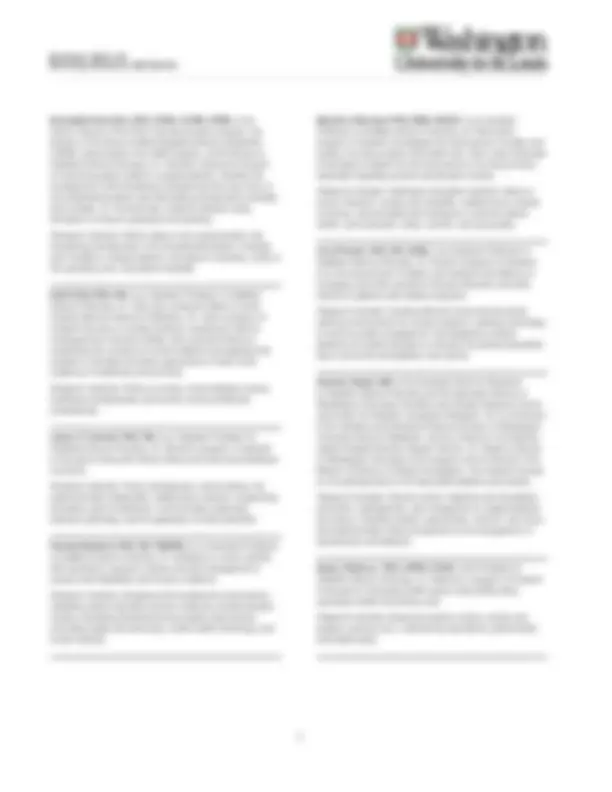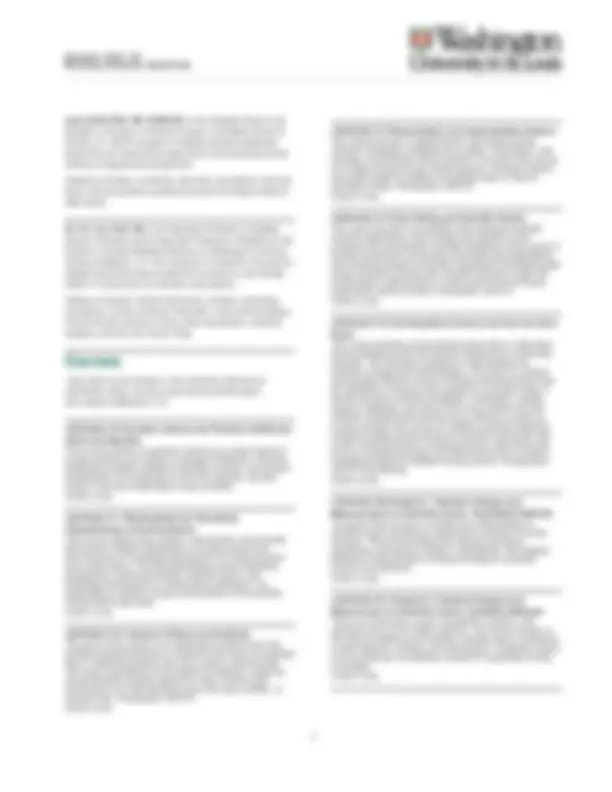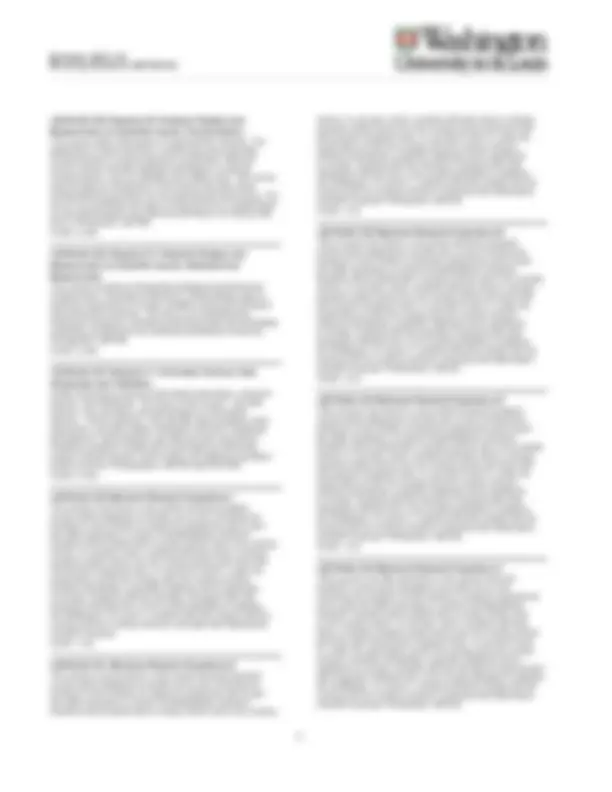





Study with the several resources on Docsity

Earn points by helping other students or get them with a premium plan


Prepare for your exams
Study with the several resources on Docsity

Earn points to download
Earn points by helping other students or get them with a premium plan
Community
Ask the community for help and clear up your study doubts
Discover the best universities in your country according to Docsity users
Free resources
Download our free guides on studying techniques, anxiety management strategies, and thesis advice from Docsity tutors
Graduate School at Washington University. The Goldfarb School of Nursing emphasizes the reciprocation among research, clinical practice, and teaching based ...
Typology: Lecture notes
1 / 6

This page cannot be seen from the preview
Don't miss anything!




N u r s i n g S c i e n c e ( 0 6 / 0 9 / 2 2 )
The Department of Nursing Science is a collaboration between Goldfarb School of Nursing at Barnes-Jewish College and the Graduate School at Washington University. The Goldfarb School of Nursing emphasizes the reciprocation among research, clinical practice, and teaching based on the belief that clinical practice advises research, research advises clinical practice, and both research and clinical practice advise teaching. The school’s commitment to the preparation of the next generation of nurse scientists is reflected in the strong research emphasis of the PhD program in the science of nursing. The goal of the PhD program is to educate nurse scientists whose career goals include conducting nursing research. Students bring a unique combination of nursing knowledge and clinical experiences to doctoral study, and these serve as the basis for the development of programs of study that are both compatible with the core doctoral curriculum and individualized to allow for the gaining of in-depth knowledge in a specialized area of study. The PhD in Nursing Science provides a solid foundation for graduates to pursue rigorous programs of nursing research that are clinically significant and contribute to the advancement of nursing science. Contact: Rebecca Boettcher Phone: 314-273- Email: rebecca.boettcher@barnesjewishcollege.edu Website: https://www.barnesjewishcollege.edu/ phd
The PhD in Nursing Science requires 62 graduate units of course work and research. Students will complete four core areas of study plus a required minor/cognate and a dissertation. The four core areas are Nursing Science, Research Methods, Statistics, and Mentored Research Experience. Students can choose a minor in informatics, clinical investigation, or dissemination and implementation science, or they may propose a customized track that is a match with nursing faculty research areas and that complements the applicant's nursing area of research. Courses in the Nursing Science and Research Methods core areas will be taught by faculty at Goldfarb School of Nursing. Courses in the Statistics core and the minor courses will be taught by faculty at Washington University. The Mentored Research Experience will be taught by scientists at both Goldfarb School of Nursing and Washington University. A Mentored Teaching Experience is also required. The program is designed to be completed in three years of full- time study. This generally involves five semesters of course work (50 units) followed by a preliminary examination, a qualifying examination, and three semesters of dissertation work (12 units). Students may be eligible for fourth- and fifth-year options if these are necessary for the completion of the proposed dissertation work.
Bernadette Henrichs (https://www.barnesjewishcollege.edu/ Employee-Search-Directory/?id=47) Interim Director, PhD in Nursing Science Program Professor, Certified Registered Nurse Anesthetist concentration, Doctor of Nursing Practice program Director, Certified Registered Nurse Anesthetist Education and Research, Washington University Department of Anesthesia PhD, Saint Louis University
Dominic Reeds Associate Dean for Research, Goldfarb School of Nursing Associate Director, Washington University’s Nutrition and Obesity Research Center and Center for Diabetes Translation Research Professor, Geriatrics and Nutritional Science Division, Washington University School of Medicine Director, Barnes-Jewish Hospital Nutrition Support Service MD, Texas Tech University Health Sciences Center
Deborah Birk Assistant Professor Director, Health Systems & Population Health Leadership concentration, Doctor of Nursing Practice program PhD, University of Missouri Maryann Bozzette (https://www.barnesjewishcollege.edu/ Employee-Search-Directory/?id=206) Associate Professor PhD, University of Washington–Seattle Mary Curtis (https://www.barnesjewishcollege.edu/ Employee-Search-Directory/?id=22) Professor Director, Adult Gerontology Primary Care Nurse Practitioner concentration, Doctor of Nursing Practice program PhD, Saint Louis University Sarah Farabi (https://www.barnesjewishcollege.edu/ Employee-Search-Directory/?id=186) Assistant Professor PhD, University of Illinois–Chicago
N u r s i n g S c i e n c e ( 0 6 / 0 9 / 2 2 ) Judy Frain (https://www.barnesjewishcollege.edu/Employee- Search-Directory/?id=39) Associate Professor PhD, University of Missouri–St. Louis Heidi Holtz Assistant Professor PhD James Kennett (https://www.barnesjewishcollege.edu/ Employee-Search-Directory/?id=181) Assistant Professor PhD, University of San Diego Pamela Newland (https://www.barnesjewishcollege.edu/ Employee-Search-Directory/?id=78) Associate Professor PhD, University of Missouri–Columbia MaryAnn Niemeyer Assistant Professor PhD, University of Missouri–Columbia Tamara Otey (https://www.barnesjewishcollege.edu/ Employee-Search-Directory/?id=140) Assistant Professor PhD, Indiana University Amy Piontek Assistant Professor PhD, Southern Illinois University–Carbondale Nancy Ridenour (https://www.barnesjewishcollege.edu/ Employee-Search-Directory/?id=167) President and Professor, Goldfarb School of Nursing PhD, Texas Tech University Mayola Rowser Dean and Professor, Goldfarb School of Nursing PhD, University of Tennessee Health Science Center Lisa Sitler Associate Professor PhD Judy Smith Assistant Dean and Professor, Undergraduate Nursing Program PhD, Saint Louis University Po-Yin Yen (https://www.barnesjewishcollege.edu/ Employee-Search-Directory/?id=166) Associate Professor, Goldfarb School of Nursing Associate Professor, Institute of Informatics, Washington University School of Medicine PhD, Columbia University
Deborah Birk, PhD, RN, MHA, NEA-BC, is the Director of the Health Systems and Population Health Leadership concentration in the DNP program and Assistant Professor at Goldfarb School of Nursing. Dr. Birk’s program of research involves executive nursing leadership and quality of nurse leaders in health systems. Research interests: Executive nursing leadership, health systems, population health, health policy, women’s health, nursing curriculum, evidence-based practice, quality improvement in healthcare, and emotional intelligence and resilience in healthcare leaders Maryann Bozzette, PhD, RN, CLC, is an Associate Professor at Goldfarb School of Nursing. Dr. Bozzette's program of research is focused on the perceptual and social development of premature infants, developmentally supportive care, and parent- infant interaction. Research interests: Sensory interventions for premature infants, biomedical measures, observational research, attachment, breastfeeding high-risk infants, and early communication behaviors of premature infants Mary Curtis, PhD, DNP, RN, is the Director of the Adult Gerontology Primary Care Nurse Practitioner concentration in the MSN program and Professor at Goldfarb School of Nursing. Dr. Curtis is a certified adult and family care nurse practitioner whose clinical practice focuses on adult primary care with an emphasis on end-of-life, palliative, and hospice care. Research interests: Injury prevention interventions, quality, safety, end-of-life care, health promotion, and action research/ scholarship of teaching and learning Sarah Farabi PhD, RN, is an Assistant Professor at Goldfarb School of Nursing. Dr. Farabi’s program of research is focused on understanding the biobehavioral mechanisms underlying obesity. She has a particular interest in the influence of diet and sleep on metabolic disturbances. Research interests: Obesity, diet, sleep, diabetes, nurse-led interventions, and pregnancy Judy Frain, PhD, RN, is an Associate Professor at Goldfarb School of Nursing. Dr. Frain’s program of research is focused on improving quality of life in older adults, with an emphasis on those living with HIV. Research interests: Symptom science, self-management of chronic disease, quality of life, and examining the intersection of aging and chronic disease
N u r s i n g S c i e n c e ( 0 6 / 0 9 / 2 2 ) Judy Smith PhD, RN, GCNS-BC, is the Assistant Dean of the Bachelor of Science in Nursing Program at Goldfarb School of Nursing. Dr. Smith’s program of applied research addresses adults who are impacted by aging and its accompanying losses utilizing a biopsychosocial approach. Research interests: Loneliness, dementia, and delirium and how these common geriatric syndromes impact the holistic health of older adults Po-Yin Yen, PhD, RN, is an Associate Professor at Goldfarb School of Nursing and an Associate Professor of Medicine in the Division of General Medical Sciences at Washington University School of Medicine. Dr. Yen’s program of research is focused on applied clinical informatics research to promote a user-friendly health IT environment for clinicians and patients. Research interests: Clinical informatics, usability, technology acceptance, human-computer interaction, user-centered design, mixed methods, literature mining, data visualization, workflow analysis, and time and motion study
Visit online course listings to view semester offerings for L88 NrsSci (https://courses.wustl.edu/CourseInfo.aspx? sch=L&dept=L88&crslvl=1:5). L88 NrsSci 510 Symptom Science and Precision Healthcare: Omics and Big Data This course focuses on symptom science as a major branch of nursing research as it relates to precision healthcare. Precision healthcare considers individual variability in genes, environment, and lifestyles. An introduction to the omic sciences, big data science, and their relationships is also provided. Credit 3 units. L88 NrsSci 511 Philosophical and Theoretical Underpinnings of Nursing Science This course explores the evolution, assumptions, and principal themes that underpin philosophies of nursing science and their influence on knowledge development for nursing practice and nursing theory. The interrelationships among theoretical perspectives, theoretical thinking, scientific inquiry, and knowledge development in nursing will be discussed. The relationship of scientific integrity and bioethics to the scientific method will be discussed. Credit 3 units. L88 NrsSci 512 Literature Critique and Synthesis The focus of this course is on synthesizing evidence from the published research literature to determine the state of knowledge about a selected research topic and to guide a research plan. The course emphasizes the processes of critiquing, analyzing, and synthesizing existing research in order to draw useful conclusions or to make decisions about the topic, problem, or research plan. Prerequisite: L88 510. Credit 3 units. L88 NrsSci 513 Dissemination and Implementation Science This course focuses on dissemination and implementation research. Strategies underlying the creation, transmission, and reception of information will be explored. The goal of this course is to bridge the gap among clinical research, everyday practice, and public health by building a knowledge base to improve population health. Prerequisite: L88 512. Credit 3 units. L88 NrsSci 514 Grant Writing and Scientific Review This course focuses on developing and evaluating fundable research applications. Grant-writing and scientific review processes are emphasized, including identifying various types of funding mechanisms, developing successful grant applications, and reviewing research proposals. Strategies for developing high impact scientific protocols and a feasible research budget will be discussed. Opportunities to conduct peer reviews of grant applications will be provided. Prerequisite: L88 513. Credit 3 units. L88 NrsSci 515 Interdisciplinary Science and the Innovative Nurse This course provides an educational opportunity to understand diverse disciplines with their specific perspective in conducting research. The emphasis is placed on understanding key scientific concepts and methodologies. The goal is to connect and integrate different schools of thought and demonstrate how the disciplines of science come together in innovative ways to identify and solve scientific challenges. Preparation, training, support, challenges, and roles of the nurse scientist are also explored. Related topics include how to advance a career as a nurse scientist with a focus on building a research trajectory, obtaining funding and becoming an innovative researcher who is able to identify trends in emerging science. Discussions will focus on integrating biologic and behavioral factors to achieve translational bench-to-bedside nursing science. Prerequisites: L88 513 and L88 534. Credit 3 units. L88 NrsSci 520 Research I: Research Designs and Measurements for Scientific Inquiry: Quantitative Methods The goal of this course is to deepen the understanding of scientific inquiry pertaining to quantitative methods in nursing research. This course emphasizes research questions/ hypotheses, frameworks, designs, methodology, and analysis. Methods of dissemination of research findings in symptom science are examined. Credit 3 units. L88 NrsSci 521 Research II: Research Designs and Measurement for Scientific Inquiry: Qualitative Methods This is an introductory course in qualitative research, with particular focus on the health sciences. The course focuses on the study of traditions and methods, scientific issues, techniques of data collection, analysis, and interpretation. Emphasis is given to the contribution of qualitative research in expanding nursing knowledge. Credit 3 units.
N u r s i n g S c i e n c e ( 0 6 / 0 9 / 2 2 ) L88 NrsSci 522 Research III: Research Designs and Measurement for Scientific Inquiry: Psychometrics This course offers information on psychometric theories. The application of these theories in constructing and evaluating measurements in nursing research is presented. Relevant course content includes statistical techniques to evaluate measurements, such as reliability and validity tests. This course also provides an introduction to the issues that arise when writing/selecting questions for the psychosocial instruments. The focus is on examining the logic of measurement in standardized survey administration and selected techniques for testing scale items. Prerequisite: L88 520. Credit 3 units. L88 NrsSci 523 Research IV: Research Designs and Measurement for Scientific Inquiry: Biobehavioral Measurement This course focuses on integrating biological and behavioral measurement. Emphasis is placed on understanding ways to optimize measurement of study variables using both biological and behavioral measures. The focus is on strengthening behavioral measures, explaining behavioral data and elucidating underlying mechanisms by employing biophysical measures. Prerequisite: L88 522. Credit 3 units. L88 NrsSci 524 Research V: Information Science: Data Abstraction and Validation Health informatics intersects information technology, computer science, and healthcare. The focus of this course -- big data science, core concepts, and technologies of information science -- will be explored. This includes data standards, data abstraction, and data validity verification relevant to database development, data analytics, and data security and privacy. Predictive research models will be developed to effectively improve clinical practice, inform policy, and address population health concerns. Prerequisites: L88 523 and M19 530. Credit 3 units. L88 NrsSci 530 Mentored Research Experience I This course is the first in a five serial mentored research course series designed to provide one-to-one mentoring for students to have hands-on research experiences and to gain the skills necessary to conduct interdisciplinary research. Students will be paired with a nursing mentor and a non-nursing mentor. In courses I and II, students will learn about a chosen research project led by the non-nursing mentor and work with that person's research team. In courses III and IV, under the supervision of both the nursing and non-nursing mentors, students will identify a scientific challenge that is significant to nursing. Students will then develop a research plan that integrates methods from a non-nursing discipline to address the challenges. In course V, students will work closely with the nursing and non-nursing mentors to develop their dissertation research proposal. Credit 1 unit. L88 NrsSci 531 Mentored Research Experience II This course is the second in a five serial mentored research course series designed to provide one-to-one mentoring for students to have hands-on research experiences and to gain the skills necessary to conduct interdisciplinary research. Students will be paired with a nursing mentor and a non-nursing mentor. In courses I and II, students will learn about a chosen research project led by the non-nursing mentor and work with that person's research team. In courses III and IV, under the supervision of both the nursing and non-nursing mentors, students will identify a scientific challenge that is significant to nursing. Students will then develop a research plan that integrates methods from a non-nursing discipline to address the challenges. In course V, students will work closely with the nursing and non-nursing mentors to develop their dissertation research proposal. Prerequisite: L88 530. Credit 1 unit. L88 NrsSci 532 Mentored Research Experience III This course is the third in a five serial mentored research course series designed to provide one-to-one mentoring for students to have hands-on research experiences and to gain the skills necessary to conduct interdisciplinary research. Students will be paired with a nursing mentor and a non-nursing mentor. In courses I and II, students will learn about a chosen research project led by the non-nursing mentor and work with that person's research team. In courses III and IV, under the supervision of both the nursing and non-nursing mentors, students will identify a scientific challenge that is significant to nursing. Students will then develop a research plan that integrates methods from a non-nursing discipline to address the challenges. In course V, students will work closely with the nursing and non-nursing mentors to develop their dissertation research proposal. Prerequisite: L88 531. Credit 1 unit. L88 NrsSci 533 Mentored Research Experience IV This course is the fourth in a five serial mentored research course series designed to provide one-to-one mentoring for students to have hands-on research experiences and to gain the skills necessary to conduct interdisciplinary research. Students will be paired with a nursing mentor and a non-nursing mentor. In courses I and II, students will learn about a chosen research project led by the non-nursing mentor and work with that person's research team. In courses III and IV, under the supervision of both the nursing and non-nursing mentors, students will identify a scientific challenge that is significant to nursing. Students will then develop a research plan that integrates methods from a non-nursing discipline to address the challenges. In course V, students will work closely with the nursing and non-nursing mentors to develop their dissertation research proposal. Prerequisite: L88 532. Credit 1 unit. L88 NrsSci 534 Mentored Research Experience V This course is the fifth and final in a five serial mentored research course series designed to provide one-to-one mentoring for students to have hands-on research experiences and to gain the skills necessary to conduct interdisciplinary research. Students will be paired with a nursing mentor and a non-nursing mentor. In courses I and II, students will learn about a chosen research project led by the non-nursing mentor and work with that person's research team. In courses III and IV, under the supervision of both the nursing and non-nursing mentors, students will identify a scientific challenge that is significant to nursing. Students will then develop a research plan that integrates methods from a non-nursing discipline to address the challenges. In course V, students will work closely with the nursing and non-nursing mentors to develop their dissertation research proposal. Prerequisite: L88 533.